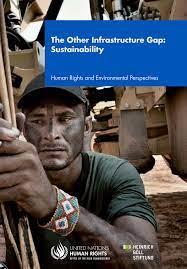
https://www.ohchr.org/Documents/Publications/InfrastructureGapSummary.pdf
The recommendations call on both the State, relevant international organizations and private actors to understand the potential human rights and environmental impacts of mega-infrastructure projects.
The publication also highlights the positive economic and social benefits of human rights and environmental risk avoidance and mitigation, and of prioritizing the rights of women, indigenous peoples and other population groups who may lack access to affordable infrastructure services.
Our need for infrastructure is pressing, yet deciding on the type and quality of infrastructure is fraught with difficulty and potential trade-offs. How can we select the right infrastructure project, enhance the opportunities of infrastructure, minimize the risks, avoid political gridlock, and ensure that infrastructure serves the public interest and purposes of the 2030 Agenda for Sustainable Development? Regional infrastructure plans and mega-infrastructure projects seek to facilitate trade, economic growth and job creation through connectivity of goods, services and people.
But these benefits do not always materialize, and the social and environmental dimensions frequently fail to receive sufficient care and attention. People without access to energy and water often continue to be neglected in mega-infrastructure planning and development. At the same time, alternative visions of low-carbon and inclusive infrastructure development are often overlooked.
The OHCHR-hbs publication argues that each mega-infrastructure project presents an opportunity to systematically generate economic, environmental and social co-benefits, while managing environmental and human rights risks. Regrettably, however, poor quality mega-infrastructure projects are commonplace.
The reasons include: (i) the complicated political economy of infrastructure investment, (ii) flawed design and process decisions, (iii) difficulties in managing private sector participation, (iv) fragmented regulatory frameworks and standards, and (v) weak accountability mechanisms. To make matters worse, in addition to the problem of poor quality infrastructure, there is also the risk that no infrastructure will be built at all.
In this challenging context, a robust national planning process informed by parliamentary debate and broad-based consultation can help to inform and frame difficult choices, improve project design and confidence in the planned infrastructure, and ensure that people's rights are prioritized over other competing interests.
Effective and accessible grievance redress mechanisms are needed to anticipate and resolve conflicts and grievances from policy-making and project decisions and actions. With these and other human rights prerequisites in place, and with proactive due diligence and management of risks, countries may more confidently make the necessary trade-offs 10 The Other Infrastructure Gap: Sustainability Human Rights and Environmental Perspectives Aerial view of highway interchange in cityscape (© Chris Sattlberger – Blend/Aurora Photos) while avoiding gridlocks and delays, and make more sustainable progress toward the SDGs. While numerous initiatives on sustainable infrastructure are presently underway, no universal set of standards is applied and enforced across all mega-infrastructure plans and projects.
National laws in these areas are frequently incomplete and are not always consistent with international law. MDBs generally have disclosure, environmental and social safeguard policies, as well as accountability mechanisms, but these do not extend to the increasingly important private sources of long-term finance.
One noteworthy initiative for improving the governance of infrastructure is the Ise-Shima Principles for Promoting Quality Infrastructure Investment, agreed at the Japanese G7 Summit in May 2016. The G20's leadership in quality infrastructure may offer an opportunity to consolidate the many fragmented initiatives on this topic and address some or all dimensions of quality infrastructure under the Addis Ababa Action Agenda (“sustainable, accessible, affordable and resilient quality infrastructure”).










Add new comment